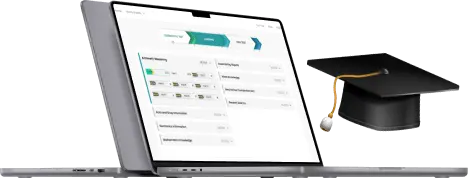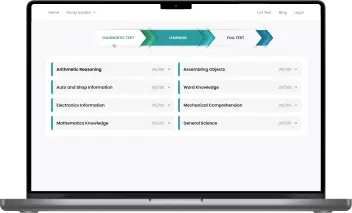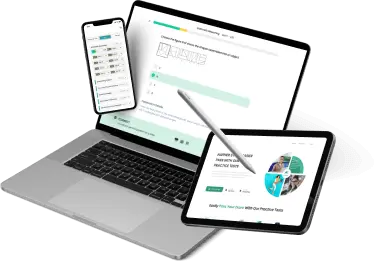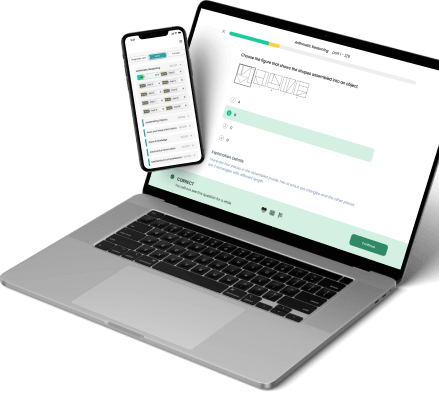Fun & effective PCCN practice test tool to pass with flying colors
All-in-one platform with everything you need to ace the PCCN on your first attempt
Clear and Thorough Learning Path
Proven PCCN 3-step Practice Formula
After our 100,000+ users' success stories, we developed a 3-step strategy to provide you with the most precise and in-depth learning path while minimizing your prep time.PCCN Diagnostic Test
First, take this short test and get your detailed report showing your strong and weak areas. Save your time by concentrating on what is in demand.Learning
With quick, bite-sized learning techniques and a detailed study guide for each PCCN section, you can really strengthen your weaknesses (from step 1) and boost your scores.PCCN Full Test
The last step for your preparation is taking our full PCCN practice tests and seeing how far you've come since the beginning. Repeat the 3-step formula until you are satisfied with your results!Ready to start?
Thousands of PCCN users already accomplished their goals.NOW it’s your turn!

What You Get

All-in-one platform
A complete PCCN Prep Platform, including a diagnostic test, detailed study guides for all topics, practice questions with step-by-step explanations, and various full simulator tests.
Questions nearly identical to those in the real PCCN test
All questions are categorized into the specific sections as on the real PCCN: Same format & same difficulty!
Best for the busy
Easily & quickly grasp all the knowledge with our unique learning technique. And you can learn anytime, anywhere on any devices, even with a few free minutes.
Practice while having fun
Learn and play! Complete round-by-round to reach your daily achievement and make progress on your learning journey!Featured on















What our users are saying
Over 50,000 aspiring American candidates use PCCN monthlyThere is no way academic institutions can properly cover the different healthcare specialties, which have become increasingly important as healthcare has become more technically advanced. Nurses have had to significantly boost their comprehension and skills to meet the ever-changing technological requirements of the career field. Obtaining the PCCN certification is an optional extra step a nurse may take to prove they have the knowledge and skills necessary to provide quality care to seriously sick patients in the modern healthcare system.
The Progressive Care Certified Nurse accreditation attests to nurses' knowledge and commitment to providing excellent care to seriously sick patients. In this article, we will provide the most up-to-date information and a comprehensive guide to ace the PCCN.
What is PCCN?
PCCN is a registered service mark of AACN Certification Corporation. The PCCN certification is a certificate awarded by the AACN Certification Corporation. This certification confirms your understanding of nursing care for critically unwell adult patients to hospital administration, colleagues, patients, and most importantly, yourself.
The American Association of Critical-Care Nurses (AACN) uses the term "progressive care" to both define a particular level of patient care and to collectively describe the areas of a hospital that provide care for acutely ill patients. Some examples of these areas include intermediate care units, direct observation units, step-down units, telemetry units, transitional care units, and emergency departments. The AACN acknowledges that progressive care is an integral component of the critical care continuum.
PCCN is a designation given to nurses who provide direct care to adult patients who are suffering from acute illnesses. Nurses who are interested in obtaining this certification may seek employment in a variety of settings, including emergency departments, step-down care, direct observation, telemetry, intermediate care, or transitional care.
When and Why Were the PCCN Certifications Established?
- PCCN: The American Association of Critical-Care Nurses (AACN) created PCCN certification in 2004 to authenticate the particular knowledge and abilities required to offer the best care to critically ill adult patients in the progressive care system.
- PCCN-K: The Progressive Care Certified Nurse-Knowledge (PCCN-K) certification was introduced in 2016 by the AACN Certification Corporation for nurses who have an impact on the care provided to severely sick adult patients but do not offer that care directly.
To ensure that certification tests and test schedules are based on real practice, the AACN Certification Corporation periodically undertakes nationwide studies of acute and critical care nursing practice. According to the results of these polls, there is a void in the provision of care for critically sick patients outside of the intensive care unit. Due to the growing complexity of patients in various parts of the hospital and the necessity to care for patients who were moving out of ICUs sicker than they had been historical, the PCCN certification was developed.
The addition of the PCCN-K to the AACN's roster of nursing credentials underscores the changing nature of nursing and the healthcare industry as a whole. A rising number of acute care nurses are becoming "knowledge professionals," or moving into roles where they may affect patient outcomes by imparting their specialized clinical knowledge to colleagues and administrators. A greater variety of progressive care nurses will be able to get certified or keep their certification current if this credential is made available to them.
Nearly 20,000 RNs at present are either PCCNs or PCCN-Ks.
Patients who used to be under my care in the intensive care unit are now in the progressive care unit. There has been a steady closing of the gap between acute and critical care, with the sickest patients now being treated as inpatients. There has never been a more pressing time for nurses to get certified in progressive care because of the increased volume of critically ill patients in today's institutions.
How is PCCN Different from PCCN-K?
PCCN is geared toward nurses who provide frontline care to adult patients in critical care settings. Intermediate care, direct observation, stepdown, telemetry, and transitional healthcare settings are common places to find these individuals.
PCCN-K is intended for registered nurses and advanced practice registered nurses who have some say in the care given to adults in the acute care setting but do not do so full-time. Clinical educators, managers/supervisors, directors, professors of nursing, and administrators of the nursing profession may be qualified.
Nurses should consider how they care for patients while deciding whether to pursue direct care or knowledge professional certification. What percentage of their time is spent directly interacting with patients and their loved ones in the course of their work? If so, the Professional Certification in Caregiving (PCCN) may be what you need. Does the job include more than just providing direct care (by, for example, training new nurses, collaborating with other medical professionals, and so on)? If so, PCCN-K could be the best option.
Before registering to take a test, nurses who aren't sure which credential would be best for them might consult the AACN certification specialists for guidance. Experts from the AACN will guide them in choosing the best certification test for their needs.
PCCN Content Outline
125 multiple-choice questions make up the PCCN examination. Only 25 questions are utilized for statistical analysis, while the remaining 100 are used to determine test performance.
The time limit for the PCCN test is 2 hours and 15 minutes. Those interested may take the exam at a local PSI/AMP testing location. Paper and pencil exam takers should expect to get their scores three to four weeks after the test date. The results of computerized examinations are immediately available upon their completion.
Clinical Judgment Professional Caring and Ethical Practices are all topics that are covered in the PCCN test.
Clinical Judgment accounts for 80% of the total score and includes the following subtopics:
- Cardiovascular (accounts for 33% of the total number of questions)
- Pulmonary (accounts for 14% of the total number of questions)
- Endocrine/Hematology/Gastrointestinal/ Renal (accounts for 18% of the total number of questions)
- Neurology/Multisystem/Behavioral (accounts for 15% of the total number of questions)
The remaining 20% of the test is devoted to Professional caring and Ethical practices, which comprise a variety of subtopics such as the following:
- Advocacy
- Collaboration
- Systems Thinking
- Clinical Inquiry
- Facilitation of Learning
- Response to Diversity
- Caring Practices
What Are the Requirements to Take the PCCN Test?
Licensure. To be eligible to take the PCCN exam, candidates need to possess a valid and unencumbered RN or APRN license. The license must be granted in the United States and cannot include any restrictions or limitations imposed by any of the state boards of nursing.
Experience. To be considered, applicants need to fulfill either one of the two clinical practice criteria.
- Option 1: The candidate must have worked as an APRN or RN and provided direct care to severely sick patients for a minimum of 1,750 hours over the previous two years in order to qualify for this option. 875 of those hours had to have been logged in the calendar year immediately prior to the application in order to qualify.
- Option 2 requires the candidate to have at least 2,000 hours of experience providing direct care to severely sick adult patients in addition to a minimum of 5 years of experience as an RN or APRN to be considered. 144 of those hours had to have been logged in the calendar year immediately prior to the application in order to qualify.
Please be aware that orientation hours, during which you followed another nurse who was caring for a critically sick patient, do not count toward PCCN eligibility since they are not directly related to patient care. You are allowed to credit those hours toward your PCCN eligibility if you were the assigned nurse and another nurse shadowed you while you were working with an extremely sick patient. This would be the only scenario in which those hours may be counted.
Hours spent supervising nursing students or other nurses at the bedside might count toward continuing education for registered nurses who hold management or education roles. These hours may only count toward the applicant's total if they were spent actively participating in the provision of direct medical treatment to a seriously sick patient.
How to Apply for the PCCN Test?
The Progressive Care Certified Nurse (PCCN) test has two different application formats for prospective candidates to choose from.
Online Application
Applicants have the option of submitting their completed applications via the AACN website. On the form, you would be asked for the number and expiry date of your registered nurse or advanced practice registered nurse license. You will also be required to provide the contact information of a colleague or clinical supervisor who can verify your eligibility. You are welcome to make payment using a credit card (Discover card, American Express card, Visa card, or Mastercard card). The processing of your application will be completed on the same day.
Paper Application
A paper application must be submitted if an applicant will be tested outside of the United States, taking a test that requires paper and pencil, or submitting with a group. Your honor statement and information about your registered nurse or advanced practice registered nurse license will be required for the application. You have the option of paying for the transaction using either a check, money order or credit card. In about two to three weeks, your application will be approved.
Please use your legal name when filling out the application since it must match the information on the picture identification that you will present on the day of the exam. Please utilize your real identity when completing the registration.
Following the submission of your application, you will subsequently be sent a confirmation email saying that your application was received successfully. Candidates who meet the requirements will get an approval-to-test email and postcards from the testing service provided by AACN, PSI/AMP, between 5-10 days after the confirmation email has been delivered. An exam identification number, instructions for scheduling the test, and a 90-day window for scheduling and taking the exam will be included in the email and postcard that will be sent to the candidate.
The PCCN exam is given year-round, from Monday through Friday, at 9:30 in the morning and 1:30 in the afternoon. Saturday appointments may be made available, however, this varies from place to location.
How Much Does Taking the PCCN Cost?
The price of the test is different for AACN members and for those who are not AACN members. The Progressive Care Certified Nurse (PCCN) test costs AACN members $185 while it costs nonmembers $285. On the other hand, there will be more specialized for each item, as described below:
The following fees will apply to you if this would be your first time taking the exam:
- AACN Members: $185
- Nonmember: $285
The following is a breakdown of the fees associated with retaking the exam:
- AACN Members: $135
- Nonmembers: $215
If you are planning to renew your PCCN certification, the following fees will apply:
- AACN Members: $135
- Nonmembers: $215
Credit cards are accepted as a method of payment for candidates who complete their applications online. Candidates who want to send their applications via the mail have the option of paying with either a credit card, a check, or a money order. When ten people or more submit their applications together in the same envelope, the group may be eligible for a discount.
How Can You Renew PCCN Certification?
Yes. The renewal procedure's goal is to ascertain whether or not the persons involved are still capable of doing the tasks required of them. Every three years, you will need to go through the process of renewing your certification. To do this, go to the AACN website and choose the Renew Certification option from the drop-down menu.
A candidate must satisfy the following conditions to be eligible for renewal:
- Maintain a valid RN or APRN license in the United States that is unencumbered and has not been the subject of any official disciplinary action taken by any state board of nursing.
- Within the three-year certification period, an RN or APRN must have completed at least 432 hours of direct patient care while working with adult patients who were seriously sick. Keep in mind that 144 of these hours need to have been completed within the previous year's calendar prior to the date that was originally slated for renewal.
- Additionally, it will be necessary for the person to either finish the necessary Continuing Education Recognition Point (CERPS) Program or retake and pass the PCCN test.
How Does PCCN Certification Help a Nurse's Career?
In addition to fostering an atmosphere of unwavering excellence in progressive care nursing and assisting registered nurses in remaining current on the most recent research and evidence-based practices, certification as a progressive care nurse acknowledges the significant clinical specialty expertise possessed by these highly skilled nurses.
People see a nurse as someone who has succeeded beyond anyone's wildest dreams when they have board PCCN accreditation and qualifications. Acquiring certification not only verifies that one has the necessary skills, but also demonstrates one's dedication to one's chosen field.
In professional magazines, one will often see advertising for the recruitment of "certified nurses," and hospitals are highlighting their certified nurses as examples of nursing excellence in their facilities. There are even companies that will give you a bonus or a pay rise after you have your PCCN certification.
How To Prepare for the PCCN Test?
That is a really interesting question. We have segmented the response into 3 separate pieces for you.
Do yourself a favor and study
You should not show up unprepared. You will find below some preparation items that we suggest, but keep in mind that they will only be useful if you really use them. In addition, research has shown that studying is the most effective treatment for test anxiety.
Take care of yourself
Check that you are getting enough sleep, exercise, and healthy food. There is a proven connection between each of these factors and increased mental capacity. If you take care of your physique, it will reflect well on your academic performance.
Get a study guide or set of flashcards
A certain mode of study may be more effective for specific individuals. Determine the areas in which you excel in your studies and focus your efforts there. We have made an effort to simplify the process for you by locating the most helpful study guide, online course, and flashcard set for your upcoming test. You'll find links to each one of them down below!
PCCN Practice Test features
- Free Practice Questions: 1000+ FREE PCCN Test practice questions with detailed explanations are available for all of the required skills. All you need to pass your recruitment test is available here.
- PCCN Test Practice Tests Based On Real Tests: Same number of questions, same time limits, same structure. The exam simulators let you familiarize yourself with the test format and get totally ready for the real one.
- No Sign-Up Or Login Required: All of your progress is saved without an account, even if you close your browser. But login can sync your data between web and mobile applications.
- Gamification: The learning process will be divided into small milestones. Let’s make your studying exciting as if you were in some interesting games.
- Personal Study Plan: Just enter your PCCN Test test date, and a study plan will be set up for you. A clear schedule will surely exceed your expectation and get you the best preparation for the reading shot.
- 3 Interesting Test Modes: 3 different test modes with increased difficulty levels let you experience the test in various ways.
- Dark Mode: Experience a dark theme that is more friendly to your eyes, and get a whole new and marvelous experience.
- PCCN Test Test Bank: 3 features: Weak/ Medium/ Strong questions help you clearly determine which area you should pay more attention.
FAQs About the PCCN
How long after taking the PCCN exam will I get my results?
Those who take the test via computer will immediately get their scores and a report on how they did. If you choose to take the exam using paper and pencil, you may expect to get your results and score report in the mail between 6 and 8 weeks after you take the exam.
What is the minimum score to pass the PCCN?
Obtaining a 68 on the PCCN test is the very minimum requirement for certification.
But what if I can't answer the question?
On the contrary. If you're stumped for an answer, taking an educated go at it might be your best bet. Your score on the test will be determined by how many questions you answer correctly. It's to your advantage to not leave any answers blank, but you won't be penalized for guessing.
How is the exam scored?
Each candidate's performance on the PCCN exam is compared to a minimum required score to determine certification. A test passing grade of 87 is required.
When taking a computerized exam, results are given immediately after completion. A paper and pencil exam result is typically sent out three to four weeks after the examination is finished.
When can I take the exam and where will I be taking it?
The test is administered twice daily, at 9 a.m. and 1:30 p.m., Monday through Friday. Most places are open on Saturdays for appointments. There are over 300 PMI/AMP testing sites throughout the United States where you will be taking the exam. Please visit www.goAMP.com to locate a center near you.
What can I do if I do not pass the PCCN exam?
You should analyze your PCCN test score report to determine which content areas need the most work. A total of four attempts at the PCCN test are allowed per candidate every 12 months. If you don't pass the exam the first time, you may take it again at a reduced rate until you do.
How long will it take for my certification to expire?
Your PCCN certification will be valid for three years in total. After that, it is up to you to ensure that it is renewed by following the appropriate procedures.
When is the PCCN exam provided?
The PCCN exam may be taken by computer-based testing every day of the year, from Monday through Saturday, at over 300 different testing locations all around the United States.
Which nurses are qualified to take the PCCN?
The PCCN test is intended for registered nurses who work in sectors such as step-down or telemetry facilities or in other units, if applicable — and offers direct care to adult patients who are suffering from acute illnesses. Because patient placement is contingent on factors such as facility and bed availability, the ultimate assessment of eligibility does not take into account the kind of unit but rather the severity of the patient's condition.
Above is all the information related to the PCCN Certification. We do hope that this article can be beneficial for you during the process of studying and preparing for this.






